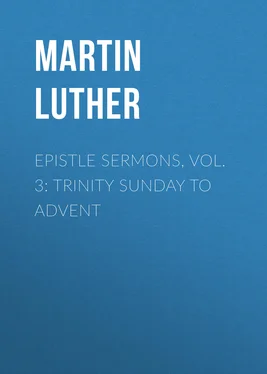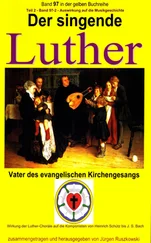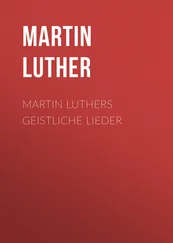Martin Luther - Epistle Sermons, Vol. 3 - Trinity Sunday to Advent
Здесь есть возможность читать онлайн «Martin Luther - Epistle Sermons, Vol. 3 - Trinity Sunday to Advent» — ознакомительный отрывок электронной книги совершенно бесплатно, а после прочтения отрывка купить полную версию. В некоторых случаях можно слушать аудио, скачать через торрент в формате fb2 и присутствует краткое содержание. Жанр: foreign_prose, foreign_religion, Философия, foreign_psychology, foreign_antique, на немецком языке. Описание произведения, (предисловие) а так же отзывы посетителей доступны на портале библиотеки ЛибКат.
- Название:Epistle Sermons, Vol. 3: Trinity Sunday to Advent
- Автор:
- Жанр:
- Год:неизвестен
- ISBN:нет данных
- Рейтинг книги:5 / 5. Голосов: 1
-
Избранное:Добавить в избранное
- Отзывы:
-
Ваша оценка:
- 100
- 1
- 2
- 3
- 4
- 5
Epistle Sermons, Vol. 3: Trinity Sunday to Advent: краткое содержание, описание и аннотация
Предлагаем к чтению аннотацию, описание, краткое содержание или предисловие (зависит от того, что написал сам автор книги «Epistle Sermons, Vol. 3: Trinity Sunday to Advent»). Если вы не нашли необходимую информацию о книге — напишите в комментариях, мы постараемся отыскать её.
Epistle Sermons, Vol. 3: Trinity Sunday to Advent — читать онлайн ознакомительный отрывок
Ниже представлен текст книги, разбитый по страницам. Система сохранения места последней прочитанной страницы, позволяет с удобством читать онлайн бесплатно книгу «Epistle Sermons, Vol. 3: Trinity Sunday to Advent», без необходимости каждый раз заново искать на чём Вы остановились. Поставьте закладку, и сможете в любой момент перейти на страницу, на которой закончили чтение.
Интервал:
Закладка:
44. His sole purpose and plan is to murder and destroy men, spiritually and bodily; even as, at the beginning, when man had been created, he led and cast him into death. He practices his schemes with awful and deadly effect in the world against those who do not believe in Christ, and he will never stop until the judgment day. One can perceive his incessant activity. He bustles about and openly raves and roars against all Christendom. He uses for his purpose the Turks, and other tyrants and godless people, not to speak of the sorrow and murder he works by so possessing people that in their frenzy they do themselves injury, or without cause murder others. He otherwise, through wicked and shameful snares, leads men into misfortune and sorrow.
In short, the world is nothing else than the devil's murderous cave, both spiritually and physically. God, in order to somewhat hinder and restrain physical murder, has ordained temporal government, parental and other authority. These in their office are to be sober, watchful, and diligent. We ought to thank God for his preservation of such authority, for otherwise there would be no peace—everywhere on earth nothing but murder. Nevertheless, the awful murder the devil perpetrates on those who are without God's Word and faith, is not thereby checked.
45. Some other defense and protection, then, another kind of watchfulness, must be sought, in order that men may remain undestroyed and unharmed in the presence of this bloodthirsty murderer. Of this Peter speaks here to the little company of Christians, and says: Ye, through Christ's blood and death rescued from the devil's lies and murderous intent, have been made alive and have been transplanted into the heavenly life, like your beloved fathers, Adam, Abel, and others. They are no longer under bondage to Satan, but live in Christ, though the body lie for a time in the earth and truth and life must be supplied to their body and soul. But because ye still dwell in the world, ye are exposed to all danger. Physically, ye are yet in the murderer's house; therefore ye must take good heed, that he may not kill you again, and murder your souls dwelling in these mortal bodies. It shall harm you none that the soul was ruined and the body is yet subject to death. "Because I live," says Christ (Jn 14, 19), "ye shall live also." However, ye must struggle if ye are to abide in the truth and life. To this ye are appointed whilst ye live here on earth; otherwise ye would already be in Paradise. But the devil has not yet been consigned wholly to the punishment of his damnation, which will be at the last day, when he will finally be cast down from his airy height, and from the earth, into the abyss of hell. Then he will no more be able to attack us, and there will no longer be cloud or veil between us and God and the angels.
SOBERNESS ESSENTIAL
46. In order, now, he continues, that ye may be saved from his murderous designs, and may preserve the life you have begun, ye must be sober and watchful; not only mindful of the body, but much rather of the mind and soul. It is true that a Christian who is to resist the devil must be physically sober, for a full hog and drunkard cannot be watchful nor can he plan defense against the devil. Yet must a Christian much more guard himself, lest the soul become sleepy or drunken. As the soul is burdened by the body when the latter is overwhelmed by drunkenness, so, when the soul is watchful and sober, the body also is temperate and prepared to hear God's Word. But where the body is oppressed by drunkenness, there the soul must first have been a drunkard, not heeding God's Word nor giving attention to prayer. Where the soul is drunken and drowned in such security, it will not avail that the body suffer hurt by strict fasting and self-mortification, after the fashion of the Carthusians and hermits.
47. Saint Peter, then, forbids not only bodily drunkenness, but also drunkenness of the soul. One's soul is drunk when he lives in carnal security, without thought and anxiety as to whether he have and hold God's Word or not; when he asks no questions, either about God's wrath or his grace; and when he, moreover, lets himself be filled with the sweet poison of false doctrine through the mob of evil spirits Satan employs for this purpose, until he grows numb, loses faith and clear judgment and finally becomes overfull of drunkenness and spews it out upon others.
48. The same thing results when men begin to be wise in divine things by following human reason. Saint Peter aptly describes this false doctrine with the expression, "cunningly devised fables," 2 Pet 1, 16. He says: "We did not follow cunningly devised fables, when we made known unto you the power and coming of our Lord Jesus Christ." Such are the beautiful words and sermons which make a great show of wisdom and holiness, and naturally please men. For instance it is a cunningly devised fable when one with the aid of philosophy, which reason can understand, sets forth in grandiloquent words what a fine thing it is for a man to live honorably, chastely, and to practice good works and virtues. The aim is, with such pretense, to have us believe that we, through these works (not alone through faith), are justified before God; that is, are redeemed from sin and death.
49. Again, other factious spirits travel about with worthy sayings which they have heard from us—externals do not help souls; the Spirit must do the work—and then they proceed to fling contempt on baptism and the Lord's Supper. So Thomas Münzer, with his seditious peasants, and the Anabaptist rabble, went about, with great demonstration, preaching about the shameful, wicked life of the world, especially of the authorities, declaring that these were godless people and tyrants, and deserved God's wrath and punishment; that therefore men should depose and execute them, and establish a new government, of only pious and holy people.
These and similar things Peter calls "cunningly devised fables." They are exaggeratingly pretended to be the product of great wisdom and art, and are rendered sweet and palatable to reason. So has all idolatry, heresy, and false doctrine, from the beginning on, prevailed, being fashioned and most beautifully adorned by people learned and wise and held in the esteem of the world.
50. How admirable did the position of Arius and his adherents appear in comparison with the true faith concerning the divinity of Christ, when they declared that though Christ should be exalted above all angels and creatures, and that all honor, dominion and power in heaven and on earth belong to him, yea, that he is quite equal to God—all this, yet he is not "homo-ousios"; that is, he is not in one undivided, divine, eternal essence, which is of such unity that it could be imparted to no one else. It would be too much to say that a man is God, etc. With such pretense was a great multitude of Christians seduced. Even few bishops remained in the pure doctrine and faith. And afterward this poison prevailed among the wise people of Asia and Greece, until Mohammed, with his Saracens and Turks, had miserably corrupted the greatest part of the world.
51. Likewise the Pope has adorned and colored with a glorious form his abominations and idolatry, claiming for his order of service that it is a meritorious and beautiful thing. Again, he calls attention to the serviceableness of the beautiful, orderly government and power of the Church, with its well regulated gradations of office and position—bishops superior to the ordinary priests, and over the bishops Saint Peter's chair at Rome. In that chair is vested the authority for the convocation of general councils so often as these may be necessary. These councils are to judge and decide in all matters of faith, and their decisions everyone must follow and obey. Again, he boasts what great service and consolation to the whole world is the work of the priests in the mass, when they daily renew and offer to God the sacrifice made by Christ on the cross. This is the sweet wine in the "golden cup" of the scarlet harlot of Babylon, with which she has made drunken all kings and nations, Rev 17, 2-4.
Читать дальшеИнтервал:
Закладка:
Похожие книги на «Epistle Sermons, Vol. 3: Trinity Sunday to Advent»
Представляем Вашему вниманию похожие книги на «Epistle Sermons, Vol. 3: Trinity Sunday to Advent» списком для выбора. Мы отобрали схожую по названию и смыслу литературу в надежде предоставить читателям больше вариантов отыскать новые, интересные, ещё непрочитанные произведения.
Обсуждение, отзывы о книге «Epistle Sermons, Vol. 3: Trinity Sunday to Advent» и просто собственные мнения читателей. Оставьте ваши комментарии, напишите, что Вы думаете о произведении, его смысле или главных героях. Укажите что конкретно понравилось, а что нет, и почему Вы так считаете.












